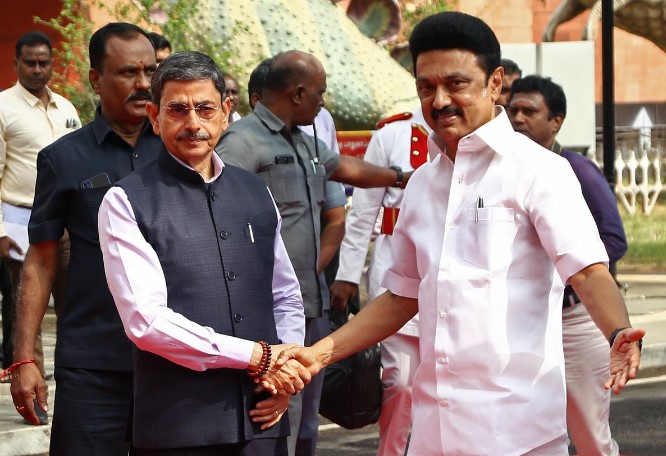- Courses
- GS Full Course 1 Year
- GS Full Course 2 Year
- GS Full Course 3 Year
- GS Full Course Till Selection
- Online Program
- GS Recorded Course
- NCERT (Recorded 500+ Hours)
- Polity Recorded Course
- Geography Recorded Course
- Economy Recorded Course
- AMAC Recorded Course
- Modern India, Post Independence & World History
- Environment Recoded Course
- Governance Recoded Course
- Science & Tech. Recoded Course
- International Relations and Internal Security Recorded Course
- Disaster Management Module Course
- Ethics Recoded Course
- Essay Recoded Course
- Current Affairs Recoded Course
- CSAT
- 5 LAYERED ARJUNA Mentorship
- Public Administration Optional
- ABOUT US
- OUR TOPPERS
- TEST SERIES
- FREE STUDY MATERIAL
- VIDEOS
- CONTACT US
The Role of Governor in the Legislature
The Role of Governor in the Legislature


Latest Context
Recently, the role of the Governor vis-à-vis the Chief Ministers with respect to the passing of bills came into the limelight in different states. Chief Ministers alleged that Governors often delay in taking action on the bills presented for their assent. It creates serious question marks on the functioning of a democracy that results in the hindering of the legislative process.
Constitutional Provisions Related to the Governor
- Article 153: It states that there shall be a Governor for each State. There is nothing in this article that prevent the appointment of the same person as Governor for two or more States. The Governor of a State shall be appointed by the President by warrant under his hand and seal (Article 155).
- Article 161: This article authorizes the Governor of a State to grant pardons, respites, reprieves or remissions of punishment or, to suspend, remit or commute the sentence of any person convicted of any offence against any law relating to a matter to which the executive power of the State extends. As per the Top Court, Governor will exercise this power to pardon a prisoner in consensus with the State government and not on his own basis. The advice rendered by the government binds the Head of the State.
- Article 163:
- There shall be a Council of Ministers with the Chief Minister at the head to aid and advise the Governor in the exercise of his functions, except in so far as he is by or under this Constitution required to exercise his functions or any of them in his discretion.
- If any question arises whether any matter is or is not a matter as respects which the Governor is by or under this Constitution required to act in his discretion, the decision of the Governor in his discretion shall be final, and the validity of anything done by the Governor shall not be called in question on the ground that he ought or ought not to have acted in his discretion.
- The question whether any and, if so what, advice was tendered by Ministers to the Governor shall not be inquired into in any court.
- Discretionary powers
- When no party has a clear majority in the state legislative assembly, Governor has the power to appoint a chief minister
- When a no-confidence motion is introduced in State Legislature
- When constitutional machinery in the State gets failed
- Article 200: It states the legislative process of passing the Bill. When a Bill has been passed by the Legislative Assembly of a State or, in the case of a State having a Legislative Council, has been passed by both Houses of the Legislature of the State, it shall be presented to the Governor and the Governor shall declare either that he assents to the Bill or that he withholds assent therefrom or that he reserves the Bill for the consideration of the President. The Governor may also return the Bill with a message requesting reconsideration by the House or Houses.
- The Supreme Court in the case of Purushothaman Nambudiri v State of Kerala, ruled that a bill which is pending for assent of Governor, will not lapse upon the dissolution of the House. The top Court drew the conclusion from the absence of the time limit in Art.200 and Art. 201 that the framers of the Constitution did not want the bill which is pending for the Governor’s approval on the risk of getting lapsed.
- Article 200(2) grants discretionary power to Governor with reference to a bill. According to it, the Governor refers a bill to the President if he is of the opinion that its passage will cause infringement upon the powers of the High Court. The top Court held that the Governor's power to reserve bills for the President's consideration shows discretionary power as mentioned in the Shamsher Singh case.
- Article 201: According to it, the President may assent to or withhold the assent from the Bill, when a Bill is reserved for the consideration of the President. The President may return the Bill to the House or Houses of the Legislature of the State by directing the Governor for reconsideration.
- Article 361: It provides complete immunity from court proceedings for any act done in the exercise of the powers to the Governor
Latest Case of Governor Withholding Assent to Bills in India
- On a Bill passed by the State Assembly in 2019, the Chhattisgarh Governor withheld his assent over it. The objective of this bill was to seek an amendment in Section 8(5) of the Chhattisgarh Lokayukta Act, 2001, in April 2020.
- The Tamil Nadu State legislature passed a Bill for seeking exemption for students from the state from the National Eligibility cum Entrance Test (NEET) needed for undergraduate medical college admissions. For the assent of the President, the Governor reserved this Bill after considerable delay, in September 2021.
- The Kerala State Legislature passed six bills but the Governor withhold its assent including on the Kerala Lokayukta (Amendment) Bill, the Kerala University (Amendment) Bill etc. By citing reservations about the constitutionality and legality of these bills, the Governor said he had, in February 2023.
Supreme Court’s View and Recommendations of Commissions regarding the Role of Governor to Withhold Assent to Bills
- Supreme Court’s View: In Nabam Rebia and Bamang Felix vs Dy.Speaker case, the top court judgement cleared that under Article 200, the discretionary power of the Governor is restricted to deciding whether a bill ought to be reserved for the President's consideration or not.
- The Court also pointed out that Article 163(2) and Article 163(1) must be read jointly suggesting that those matters which need the Governor to act autonomously are beyond the purview of judicial challenge. Hence, to withhold assent to a bill indefinitely will be considered unconstitutional, and in this regard, Governor's action or inaction can be subject to judicial review.
- Punchhi Commission (2010): As per this commission, there should be a time limit under which the Governor must take the decision regarding the granting assent or reserve it for consideration of the President.
- National Commission to Review the Working of the Constitution (NCRWC): According to the report of this Commission, there must be a time limit of four months under which the Governor must take a decision in order to decide for granting assent or saving it for the consideration of the President.
- It also recommended the removal of the power of the Governor for withholding assent on a bill and saving a bill for the consideration of the President except the provisions mentioned under Art.200 of the Indian Constitution.

Prelims
Q. Which of the following are the discretionary powers given to the Governor of a State? (2014)
1. Sending a report to the President of India for imposing the President’s rule
2. Appointing the Ministers
3. Reserving certain bills passed by the State Legislature for consideration of the President of India
4. Making the rules to conduct the business of the State Government
Select the correct answer using the code given below:
(a) 1 and 2 only
(b) 1 and 3 only
(c) 2, 3 and 4 only
(d) 1, 2, 3 and 4
Ans: (b)
Mains
Q. Whether the Supreme Court Judgment (July 2018) can settle the political tussle between the Lt. Governor and elected government of Delhi? Examine. (2018)
Q. Discuss the essential conditions for exercise of the legislative powers by the Governor. Discuss the legality of re-promulgation of ordinances by the Governor without placing them before the Legislature. (2022)



